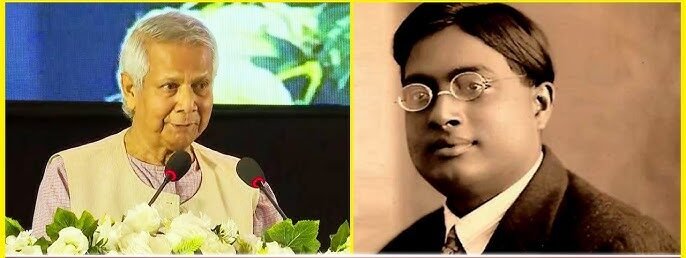Satyendra Nath Bose: The Pioneer of Quantum Statistics
Satyendra Nath Bose was a distinguished physicist whose contributions have significantly shaped the landscape of quantum mechanics and particle physics. Bose’s academic journey led him to publish groundbreaking papers that would lay the foundation for what is now known as Bose-Einstein statistics. His work delved into the behavior of indistinguishable particles, an area of study that was crucial for understanding quantum systems.
One of Bose’s most notable accomplishments was his collaboration with the physicist Albert Einstein. In 1924, he forwarded his work on quantum statistical mechanics to Einstein, who recognized the importance of Bose’s theories and translated his findings into German for publication. This collaboration not only solidified the foundations of what would later be termed “Bose-Einstein statistics” but also highlighted the significance of cooperative research in advancing the field of physics. The concept of Bose-Einstein condensates, a state of matter occurring at temperatures close to absolute zero, has opened new avenues of research in quantum physics, further illustrating the importance of Bose’s contributions.
Bose’s legacy extends beyond his scientific lineage; he is a symbol of national pride for Bangladeshis and serves as an inspiration to aspiring physicists around the world. His role as an academic leader is equally noteworthy; he was a professor at the University of Dhaka and contributed to higher education in the region. His work not only influenced contemporary researchers but also paved the way for future generations to explore the quantum realm. While the complexities of quantum mechanics can be daunting, Bose’s pioneering spirit demonstrates how one individual’s passion for science can leave an enduring impact on the global arena, further underscoring the significance of his contributions to the scientific community. His legacy continues to resonate, reminding us of the profound link between theory, experimentation, and discovery.
Dr. Muhammad Yunus: Champion of Social Business and Poverty Alleviation
Dr. Muhammad Yunus, a prominent figure in the global arena, is widely recognized for his pioneering contributions to microfinance and social entrepreneurship. As the founder of Grameen Bank in 1983, Yunus aimed to combat poverty in Bangladesh by providing small loans to the underserved populations, particularly women. His innovative approach, which empowers individuals through financial support, has become a blueprint for similar initiatives worldwide. By utilizing microcredit, Dr. Yunus has enabled millions to commence income-generating activities, significantly improving their socioeconomic status.
At the heart of Yunus’s philosophy is the belief that poverty is not merely a lack of financial resources but also a lack of opportunities. Grameen Bank’s model addresses this by creating a financial ecosystem that allows borrowers to develop small businesses, making it possible for them to escape the cycle of poverty. The success of this model has not only uplifted individuals but has also positively impacted families and communities, fostering a sense of empowerment among women who are often the primary clients of microfinance. By targeting women, Yunus has played a critical role in enhancing gender equality, proving that when women thrive, entire communities benefit.
Dr. Yunus’s efforts have garnered international acclaim, culminating in the receipt of the Nobel Peace Prize in 2006, which he shared with Grameen Bank for their contributions to social business and poverty alleviation. This recognition highlights the significance of his work not just in Bangladesh but across the globe. Many countries have since adopted similar microfinance models, demonstrating the far-reaching influence of his ideas. The United Nations also recognized Yunus’s contributions by declaring 2005 the Year of Microcredit, further solidifying the importance of his legacy in the fight against poverty.
Fazlur Rahman Khan: Architectural Innovator and Visionary
Fazlur Rahman Khan, born on April 3, 1929, in Dhaka, Bangladesh, emerged as a pioneering architect and structural engineer renowned for his groundbreaking contributions to the field of architecture. His tenure at Skidmore, Owings & Merrill (SOM) in Chicago marked a significant evolution in the design of tall buildings, where he introduced innovative structural concepts that transformed urban skylines worldwide. Among his notable masterpieces are the Willis Tower, formerly known as the Sears Tower, and the John Hancock Center, both of which stand as testaments to his ingenuity.
One of Khan’s most significant contributions to architecture was his development of the “tube structure,” a design strategy that enhanced the stability and flexibility of skyscrapers. This revolutionary approach utilized closely spaced columns and beams to create a robust structural system that efficiently supports a building’s weight while maximizing usable space. Consequently, this method significantly reduced construction costs and time, making skyscrapers more feasible in urban settings worldwide. His work led to the construction of some of the tallest buildings, enabling cities to reach new heights and redefine their skylines.
Khan’s influence extended beyond engineering; he championed the integration of aesthetic and functional design, emphasizing that architecture should not only be structurally sound but also culturally resonant. His philosophy pushed the boundaries of what was possible in architecture, merging technical prowess with artistic vision. Through his achievements, Khan provided inspiration to countless architects and engineers, establishing a legacy of innovation and excellence in the industry.
As a Bangladeshi, Fazlur Rahman Khan serves as a source of immense national pride. His life’s work exemplifies the potential for creativity and technical skill to converge, leaving a lasting impact on the global architectural landscape. Today, he symbolizes the aspirations of Bangladeshis, encouraging future generations to pursue careers in science, technology, engineering, and mathematics (STEM) fields.
Bangladeshis in the Global Context: A Source of National Pride
In recent decades, the contributions of Bangladeshis on the global stage have become increasingly prominent, reflecting the nation’s rich cultural heritage, skilled labor force, and active participation in various sectors. From renowned entrepreneurs to influential artists and dedicated politicians, individuals of Bangladeshi origin have made significant strides, showcasing their talents and illuminating the global landscape. These achievements not only enhance the international perception of Bangladesh but also instill a profound sense of pride among its citizens both at home and abroad.
Bangladeshis have excelled in numerous areas, including medicine, technology, business, and the arts, establishing themselves as trailblazers within their respective fields. For instance, the success of Bangladeshi professionals in the healthcare sector, particularly in the diaspora, serves as a testament to their dedication and expertise. Furthermore, cultural figures and artists have been instrumental in promoting Bengali heritage, ensuring that the unique traditions and narratives of Bangladesh resonate with global audiences.
The significant role of Bangladeshi laborers, particularly in the Middle East and Southeast Asia, deserves particular attention. Their contributions to economic growth in host countries while simultaneously supporting their families back home are vital for understanding the depth of Bangladesh’s global engagement. This labor has also fostered a strong sense of community and resilience among expatriates, as they navigate the challenges of living abroad while maintaining strong ties to their homeland.
Recognizing and celebrating these influential figures is essential, as they serve as role models for future generations. Their stories of achievement inspire young Bangladeshis to aspire to greatness, reinforcing the belief that their efforts can transcend borders. Indeed, the collective impact of Bangladeshis worldwide not only enriches global discourse but also forms an enduring source of national pride that strengthens identity and solidarity among the people of Bangladesh.


Leave a Reply
You must be logged in to post a comment.